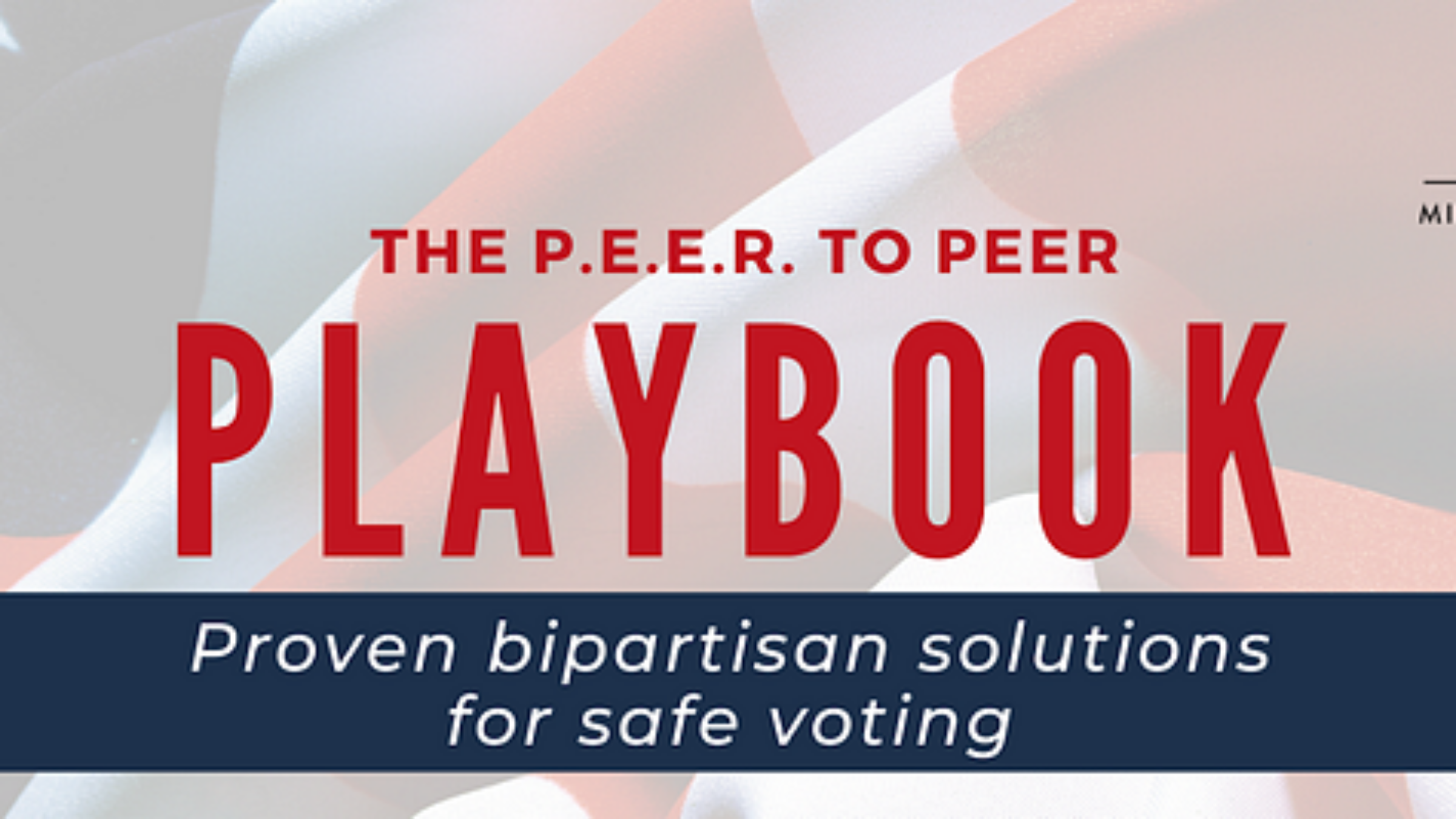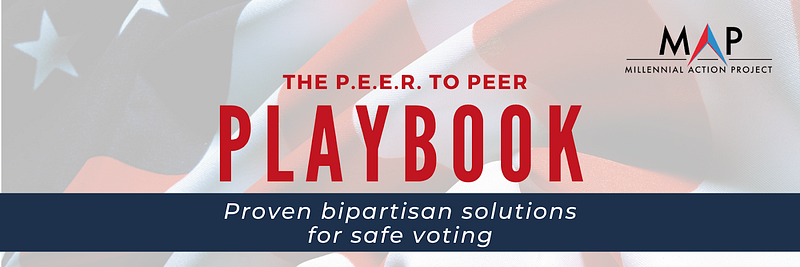President’s Update on Safe Voting
July 21, 2020

Since we launched the Partnering to Ensure Election Resiliency (P.E.E.R.) Project four months ago, MAP has listened to and activated over 150 elected leaders from across the political spectrum and created a unique reservoir of post-partisan resources and policies to support safe voting. Through national briefings conducted virtually, state-specific voter education efforts, and curated bipartisan policy resources, MAP’s P.E.E.R. Project has evolved with the ongoing COVID-19 crisis. At its core, the initiative aims to equip and mobilize our unique legislator network to safeguard the 2020 elections, creating healthy voting options like absentee voting, while also supporting election administrators.
These efforts and learnings culminate today in the release of our P.E.E.R-to-Peer Playbook: Proven bipartisan solutions for safe voting. This playbook highlights what works — the best safe voting solutions we have seen across the country. By partnering with our legislators, we can attest that each of these solutions have already gained bipartisan support and been enacted in key Battleground states. We are now cross-pollinating these policy recommendations, implementation tips, and talking points, drawing from successful bipartisan examples of COVID-19 election policy responses. While no single set of solutions will be appropriate for every state, many of these proven solutions can be adapted and scaled.

As we celebrate the publication of this playbook, we must reflect on the deep work that it took to get here and the challenges that still lie ahead. Below are some of the key actions from MAP and our Future Caucus leaders that have paved the way for a safer election this year:
Key Wins in Battleground States
We are very encouraged by the bipartisan progress in Midwestern battleground states to mail out absentee ballot requests. In my home state of Wisconsin, we are engaging legislators in consensus-building dialogues around how both Republicans and Democrats can support absentee voting. Rep. Tyler Vorpagel (R-Plymouth) said it best when I interviewed him on Meeting in Middle America in May:
I think everybody should vote. Everybody should be informed and participate in the system… That’s not a Republican idea or a Democrat idea. To the extent that we can get that message out there and create some creative content for people to know how they can easily get a ballot, I think it’s a great opportunity.
While national political observers believed it would be near impossible to achieve, bipartisan support in the state legislature helped secure the unanimous decision of the Wisconsin Elections Commission to send absentee ballot request forms to the 2.7 million Wisconsin voters who have not already requested absentee ballots. As part of this decision, unregistered voters are also receiving information on how to safely register to vote. The mailing is fully paid for by an Elections Assistance grant from Congress.
In Ohio, Founding Future Caucus Co-Chair and current Secretary of State Frank LaRose has been an early and effective advocate for safe and secure voting. Following his lead, the bipartisan Ohio Controlling Board authorized for all 7.8 million voters in Ohio to be mailed an absentee ballot request form for the November election. Secretary of State LaRose has also issued a directive for Ohio’s 88 county boards of elections, providing federal funding for them to print additional ballots, secure plenty of PPE, and increase poll workers to offer safe in-person voting options this fall.
In Iowa, our MAP state legislative co-chairs were vocal proponents of VoteSafe Iowa, an initiative that mailed out absentee ballot applications to voters and helped educate voters on how to participate through the absentee voting system. MAP has also worked behind the scenes with SFCN members in Georgia, Indiana, Oklahoma, Mississippi and Connecticut to provide vital information and resources, empowering legislators to address the needs of their states.
Unified Public Statement
In May, we issued an open letter signed by 34 young state legislators from 19 states. These legislators made a unified call for local, state, and federal support of the following recommendations:
- Urging Congress to include more election funding in the upcoming stimulus package and avoid further conditional state matching requirements;
- Ensuring that in-person voting remains an option, but also that risks are minimized by limiting exposure and taking extra precautions, including adequate PPE;
- Removing excuse requirements for absentee ballots;
- Scaling-up the mail voting apparatus in order to accommodate a higher volume of mailed ballots;
- Simplifying the ballot request process and leveraging technology to enhance ballot security.
Through unified statements like these, MAP and the members of our State Future Caucus Network are proving that election resiliency truly is a bipartisan mission.
Educating Voters Through Election Changes
Following the announcement of the VoteSafe Iowa initiative, our Iowa Future Caucus Co-Chairs took the lead in a state-wide effort to educate their constituents on new absentee mail-in ballot request procedures. Through a pair of MAP-organized videos released on social media, these young leaders set an example for legislators across the US, working together to create bipartisan messaging and encouraging all Iowans to protect their health — and the health of others — by choosing to vote-by-mail. We look forward to equipping other Future Caucus legislators with the steps and tools they need to make similar videos in the coming months.
Engaging with Partners
To share what we have learned and multiply our effectiveness, we are engaging partner organizations on election resiliency. On June 5th, our State Caucus Manager, Alex Tapia joined the Women’s Public Leadership Network (WPLN) alongside representatives from We Can Vote and the R Street Institute for a virtual panel. Across the political spectrum, we found consensus among the panelists that mail-in voting is secure and there is a need for increased federal support to ensure that states are prepared for November.
Our Executive Director and COO Layla Zaidane has also expanded our reach by joining the Advisory Board of We Can Vote, a nonpartisan coalition of public health experts, civic organizations, businesses, and elected officials who are dedicated to making the 2020 elections safe, secure, and successful. Partnerships like these ensure that the learning we do is not confined to those already in our network, and they help us learn valuable information too.
Looking Forward
After focusing our Spring season on listening and identifying legislator champions (‘Phase 1’), this work represents ‘Phase 2’ of MAP’s P.E.E.R. Project: building bipartisan buy-in for safe voting and strengthening the absentee voting system. In the coming months, MAP will continue to support legislative and administrative actions to strengthen absentee voting and circulate tools for legislators to craft bipartisan bills. However, we will also shift more resources towards empowering our leaders to educate the public on safe voting, especially in battleground states.
The 2020 pandemic, worsened by historic polarization, represents one of the greatest threats to our democracy in our lifetimes. The American experiment depends on safe and credible elections, as well as leaders with the courage to build bridges and take action. That’s why the P.E.E.R. Project couldn’t be more urgent. I invite you to join us today by getting involved or making a donation.
Onward,
Steven Olikara
Founder and CEO | Millennial Action Project






Join 1,900+ BIPARTISAN LEADERS NATIONWIDE
Be a part of a network of lawmakers committed to governing effectively, passing more representative public policy, and increasing public trust in democracy.